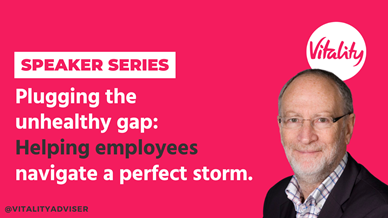Five things PMI can do that your client might not know about
Whether it’s helping clients access preventative support, primary care and diagnostics, or delivering more integrated end-to-end healthcare to drive better outcomes and deliver value from day one, PMI is expanding.
With the ongoing challenges facing the NHS and demand for Private Medical Insurance (PMI) at an all-time high, there’s never been a better time to discuss what’s on offer through PMI plans with your clients.
But whilst many people will have a basic understanding of how PMI works, the scope of products has broadened considerably in recent years and they now provide more than just access to treatment while delivering far more value than clients might expect.
Here we explore just five things PMI can do that your clients might not be aware of:
1. Access to expanded primary care
Primary care is a fundamental aspect of healthcare, but demand for it is greater than ever1.
Vitality was the first insurer to bring primary care to PMI, with the launch of Vitality GP in 2015. Since then uptake has snowballed. In 2022, more than half of Vitality health claims were for primary care services alone2. Especially as these services have expanded to included mental health support and physiotherapy too.
Such treatments – including cognitive behavioural therapy - give clients access to vital support to prevent and manage health conditions. By cutting out the need for GP referrals, we can also speed up access, while the recent removal of underwriting for mental health means all clients with a VitalityHealth plan can now utilise Talking Therapies regardless of medical history.
On top of these services, PMI primary care services can cover everything from diagnostic testing such as blood tests and x-rays, as well as private prescriptions. With no excess to pay and up to £100 per plan year to spend, clients can also save money on these everyday private healthcare costs.
2. Help clients save money
As the ongoing cost-of-living crisis continues to bite, it’s more important than ever that insurance products deliver real tangible value and help clients to save money.
Given the high potential costs of treatment and growing numbers of people forced to self-pay for private healthcare, simply opting for private medical insurance in the first place can offer significant cost savings3, especially if purchased at an age it is more affordable.
According to analysis into hospital costs by Vitality4, the average cost to go private for a hip or knee replacement for example is around £12,000, whilst private treatment for breast and prostate cancer is around £35,000 and £22,500 respectively. The average UK PMI premium meanwhile is £125 a month5, and depending on a client age and the benefits they select, this can be much lower.
As private medical insurance plans expand and offer a wider range of benefits, including tools to help clients manage and improve their health, alongside additional incentivised rewards and benefits, there are also increased opportunities to deliver immediate tangible value to clients. These come in the form of handcrafted coffees, discounted gym membership and access to wearable technology to name just a few.
Furthermore, by offering an incentivised rewards programme backed up by behavioural science, we can not only through their engagement give them more control over the premiums they pay each year and lower their costs through ABC Pricing, we can help prevent clients from getting ill in the first place.
3. The prevention of illness
Accounting for nearly half (43%) of the UK health burden6, preventable disease places a significant strain on healthcare systems.
Helping clients to improve their health and prevent illness from arising therefore has benefits socially as well as individually. PMI plans that can support clients in this area can play a key role in reducing the burden on public healthcare systems and easing some of the pressure on the NHS.
Lifestyle risk factors are a particular leading cause of preventable illness, with 88% of preventable disease in the UK down to lifestyle related choices6. A Global Burden of Disease study found that the top risk factors driving mortality and morbidity in England were smoking, obesity, high blood pressure, high blood sugar, poor diet and alcohol use7.
Backed up by behavioural science, the Vitality Programme is about supporting clients to manage and improve lifestyle health factors – such as physical activity and eating better – through incentivisation and rewarding positive lifestyle choices. We see this approach clearly paying off, with analysis of VitalityHealth claims between 2017 and 2021 showing up to 46% lower claims costs for highly engaged members across major claims categories8.
Through our latest enhancement – Next Best Action – we’ve taken the programme a step further to provide more tailored, personalised support to help clients improve their health in relation to the major causes of disease, such as smoking and obesity, though incentivised access to evidence-based clinical partners.
4. Complete end-to-end care
As PMI products have evolved and the scope of cover has broadened, plans increasingly provide clients with a complete end-to-end healthcare proposition. This approach can serve to both deliver more immediate value to clients through everyday healthcare benefits, whilst also driving better health outcomes through a more joined up focus on prevention, treatment and rehabilitation.
At Vitality, our unique partnership with OnkoHealth is a great example of how holistic wellbeing interventions – focusing on nutrition, physical activity and mental health – can optimise the rehabilitation outcomes for clients undergoing cancer treatment as part of an end-to-end healthcare journey.
5. Access to cutting-edge digital healthcare
On one hand, digital innovation is providing clients with quicker and easier access to PMI treatment and services. Our Care Hub, for example, provides a one-stop shop were clients access everything they need from their healthcare plan, along with instant digital authorisation to speed up onward diagnostics and treatment.
Digitisation and technology are also revolutionising the provision of healthcare services, especially in the prevention, treatment and management of conditions and means that more of these services can be delivered to clients remotely.
Where appropriate, PMI products are able to deliver everything from digital diagnostics and at-home screening to home-based treatments such as chemotherapy, in a way that is much more tailored to individual patient needs.
Furthermore, PMI can also provide clients with a route to cutting-edge treatments, based on new and advanced medical techniques, that are not yet available on the NHS. For example, our clinical team, which keeps track of the latest trials, authorised around 40 new treatments in 20199.
Where to next?
-
Why Novo Nordisk was named Britain's Healthiest Workplace
We sat down with the mid-sized organisation to hear how it got the ‘sanity check’ it needed through taking part in the UK’s largest employee wellbeing survey.
-
How a small tech firm is supporting its people
After it was named Britain’s Healthiest Workplace in the ‘Small Organisations’ category, we sat down with OpenCredo to hear how it is taking a ‘people-first’ approach to its workplace wellbeing strategy.
-
Speaker Series | Plugging the unhealthy gap
Explore the changing role employers have to play in supporting the mental, physical and financial health of employees as they face a perfect storm in the UK.
-
Insights Hub
Our Insights Hub brings you our range of adviser content - from video series to articles & blogs.
1 item-6-public-board-meeting-access-to-primary-care-revised.pdf (england.nhs.uk)
2 Vitality Health Claims Insights 2022
3 NHS waits force patients to pay for private ops - BBC News
4 Vitality Claims data 2019-2020
5 https://www.unbiased.co.uk/life/managing-your-money/should-i-get-private-health-insurance
6 Global Burden of Disease database; Williamson, E., Walker, A. J., Bhaskaran, K. J., Bacon, S., Bates, C., Morton, C. E., ... & Cockburn, J. (2020)
7 NHS England » About the prevention programme
8 Vitality Health Claims Insights Report, 2022
9 Vitality 2019 data



